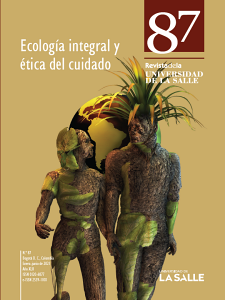Abstract
<p>El presente estudio surge del interés por indagar acerca de las percepciones de docentes y estudiantes universitarios de programas presenciales en seis universidades colombianas de diferentes regiones (tres públicas y tres privadas), en relación con las dificultades y potencialidades de la incorporación de mediaciones tecnológicas en procesos formativos presenciales como mecanismo para mantener la oferta del servicio educativo en tiempos de pandemia. Metodológicamente, es un estudio mixto cuantitativo y cualitativo, de diseño no experimental. Como instrumento de medición se utilizó una encuesta estructurada, la cual tuvo unas pequeñas variaciones para cada una de las poblaciones objetivo. Dado que es un estudio de carácter descriptivo, se aplicó la encuesta a una muestra no probabilística por conveniencia, en la que participaron 431 docentes y 940 estudiantes. Por una parte, los datos arrojados permitieron corroborar las tendencias establecidas en otros estudios, relacionadas con las dificultades de conectividad, el desconocimiento de las plataformas tecnológicas y la resistencia a su implementación como mediación pedagógica; por otra parte, la necesidad de formación de los docentes en los aspectos tecnológicos propios de las plataformas utilizadas, las alternativas pedagógicas más adecuadas para la formación y evaluación en estas metodologías, y el desarrollo de procesos de autorregulación y autonomía, indispensables para que los estudiantes puedan desarrollar sus aprendizajes de forma adecuada. Adicionalmente, es reconfortante comprobar que tanto docentes como estudiantes han asumido el reto y cada vez son mayores las posibilidades que encuentran en estas modalidades formativas.</p>References
Aristovnik, A., Keržič, D., Ravšelj, D., Tomaževič, N. y Umek, L. (2020). Impacts of the COVID-19 Pandemic on life of higher education students: A global perspective. Sustainability, 12(20), 8438-8438. https://doi.org/10.3390/su12208438
Arora, A. K. y Srinivasan, R. (2020). Impact of pandemic covid-19 on the teaching – learning process: A study of higher education teachers. Prabandhan: Indian Journal of Management, 13(4), 43-56. https://doi.org/10.17010/pijom/2020/v13i4/151825
Brusilovsky, P. y Millán, E. (2007). User models for adaptive hypermedia and adaptive educational systems. En The adaptive web (pp. 3-53). Springer.
Dreesen, T., Akseer, S., Brossard, M., Dewan, P. y Giraldo, J. (2020). Promising practices for equitable remote learning: Emerging lessons from COVID-19 education responses in 127 countries. https://doi.org/10.18356/3ec22dd9-en
García Aretio, L. (2020). COVID-19 y educación a distancia digital: preconfinamiento, confinamiento y posconfinamiento. RIED. Revista Iberoamericana de Educación a Distancia, 24(1), 09-09. https://doi.org/10.5944/ried.24.1.28080
Giannini, S. (2020). Covid-19 y educación superior: de los efectos inmediatos al día después. Revista Latinoamericana de Educación Comparada, 11(17), 1-57.
Gómez, S., Zervas, P., Sampson, D. G. y Fabregat, R. (2012). Delivering adaptive and context-aware educational scenarios via mobile devices. 2012 IEEE 12th International Conference on Advanced Learning Technologies, 197-201.
Harari, Y. N. (2018). 21 lecciones para el siglo XXI. Penguin Random House.
INTEF. (2020). Instituto Nacional de Tecnologías Educativas y de Formación del Profesorado. https://intef.es/
ISTE. (2008). International Society for Technology in Education. https://www.iste.org/
Keller, J. M. (1999). Using the ARCS motivational process in computer-based instruction and distance education. New directions for teaching and learning, 1999(78), 37-47.
Laudon, K. C. y Laudon, J. P. (2015). Management information systems. Pearson Upper Saddle River.
Mayes, T. y de Freitas, S. (2007). Learning and e-learning. Rethinking pedagogy for a digital age, 13-25.
Mejía, C., Baldiris, S., Gómez, S. y Fabregat, R. (2008). Adaptation process to deliver content based on user learning styles. International Conference of Education, Research and Innovation, 5091-5100.
MEN. (2013). Competencias TIC para el desarrollo profesional docente. https://bit.ly/3zXuk4c
Mishra, L., Gupta, T. y Shree, A. (2020). Online teaching-learning in higher education during lockdown period of COVID-19 pandemic. International Journal of Educational Research Open, 1, 100012-100012. https://doi.org/10.1016/j.ijedro.2020.100012
Murphy, M. P. A. (2020). COVID-19 and emergency eLearning: Consequences of the securitization of higher education for post-pandemic pedagogy. Contemporary Security Policy, 41(3), 492-505. https://doi.org/10.1080/13523260.2020.1761749
Pedró, F. (2020). COVID-19 y educación superior en América Latina y el Caribe: efectos, impactos y recomendaciones políticas. Análisis Carolina, 1(1), 1-15. https://doi.org/10.33960/ac_36.2020
Pham, H. H. y Ho, T. T. H. (2020). Toward a ‘new normal’ with e-learning in Vietnamese higher education during the post COVID-19 pandemic. Higher Education Research and Development, 39(7), 1327-1331. https://doi.org/10.1080/07294360.2020.1823945
Reimers, F. y Schleicher, A. (2020). Un marco para guiar una respuesta educativa a la pandemia del 2020 del COVID-19. Enseña Perú.
Toquero, C. M. (2020). Challenges and opportunities for higher education amid the COVID-19 pandemic: The Philippine context. Pedagogical Research, 2020(4), 2468-4929. https://doi.org/10.29333/pr/7947
Webb, E., Jones, A., Barker, P. y Van Schaik, P. (2004). Using e-learning dialogues in higher education. Innovations in Education and Teaching International, 41(1), 93-103.



